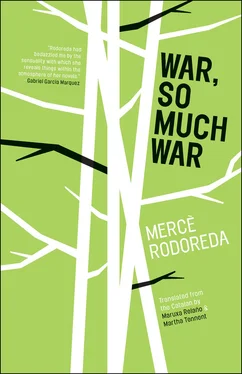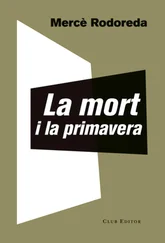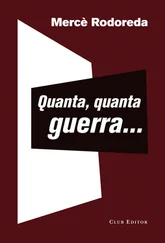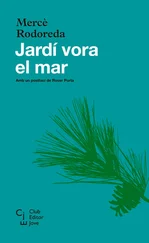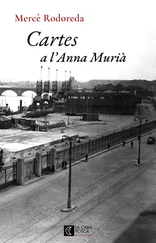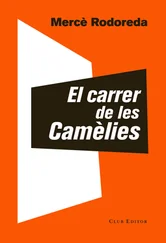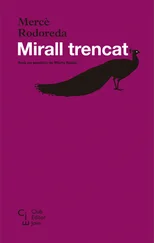THE HENHOUSE WAS AT THE BACK OF THE VEGETABLE GARDEN. I crept toward it, like a wolf stealing through the artichokes. A hen was clucking like mad. I would eat her egg. The frightened fowl stood over her nest, legs deep in the straw, staring at me. The egg tasted like hazelnuts. Three more hens, still as death, craned their necks forward as they perched on their nests. Their wattles drooped, their combs drooped, they were old hens, had laid many eggs, marched many little chicks around. I heard the sound of a slamming door coming from the direction of the house, followed by the squeak of a pulley. The egg had made me hungry. I left the vegetable garden. There wasn’t a village in sight. I was surrounded by fields. I was suddenly struck by a flash of sadness, and I shook it off in a hurry. Somehow, I would find what I needed. I continued on my way, slit-eyed, blinded by a sun that had a deeper yolk color than the egg I had just swallowed. I was walking in the bright sunlight, my mind on other things, when I tripped and fell, bloodying my knee. The blood was red, redder than a red carnation, redder than the drooping combs of those golden hens.

In an effort to take my mind off my hunger, I tried to get some sleep by the side of the road, among the weaver’s broom. In an effort to take my mind off my hunger and hoping that someone might pass by, like the old man with the peach. . I was dreaming I was little and wasn’t walking yet, that I was watching a stopped train that was very long and shrouded in fog. . when someone took my hand. It was a friendly hand. A hand in the middle of a river with banks graced by rushes and reeds. That hand was Eva, the whole of her; she had spotted someone lying on the ground, wounded perhaps, and had come to help. She was clad in militia overalls, boots, a faded sweater, and a cap. Those violet eyes looked at me as though looking at the world and everything good in it, and that notion sent a wave of shame rushing to my cheeks. She said observing me had calmed her heart. She had seen so many people lose their lives that sometimes when she thought of me she pictured me dead and that pained her. . dead in the attack on the mill that belonged to her parents who were not her parents. She had chosen her real parents; they were the Sky and the Earth, he laden with stars, she with flowers. I wanted to ask her if she had been the one riding the white horse out of the mill that night, and why she had told me down by the river that if she were a boy she would go off to war, and why — being a girl — she had gone to war, and why she hadn’t said as much when we got to the bridge and she told me to wait for her. I wanted to ask her how she knew that the mill had burned down. . But I didn’t say anything because she sat down beside me and, leaning to the side, drew the knife I had given her from her pocket and showed it to me, it’s broken, she said. I tried to open a box using the screwdriver as a lever, and there you have it, a broken screwdriver. She was happy to see me again; in a low voice, she added that she had never liked people who loved her. To love her was to shackle her, it didn’t allow her to move. She needed to be herself and be free to go wherever she wanted and help whomever she wanted, without the sense that doing so was an obligation. I like you. . because you don’t tie me down and because of that look you have on your face. I’ve only been with you for a few hours but I’ve always remembered you; I think of you often, even if I don’t see you. We met in the water. . She remained silent for a while; I couldn’t take in everything she was saying. Sometimes my nature is to run away. . the dead are the only ones who don’t frighten me. They ask for nothing; that’s why I feel sorry for them, and love them, especially because I sometimes think that I’m more dead than alive. . if things made any sense I would have died lives and lives ago, mine and other people’s lives. . They have to be buried deep in the ground so they can rest forever close to the roots. And become trees.
She let go of my hand and I felt a pang of abandonment. She looked down at the ground for a while and then, without lifting her eyes, she explained that she had taken three badly wounded soldiers to a field hospital at the army’s rearguard so they could die in peace. They were young like you, with as much desire to live as you have. See that Red Cross truck by the shrubs? There’s a cross on the sides and on the roof of the truck. See the red of the cross? When I was little my father killed a cat, I don’t know what it had done to him; I witnessed it and it broke my heart. I buried it in the early morning by the bridge where I told you to wait for me. Remember, the day we met? I made a cross of red flowers on top of it. And some evenings, when the setting sun is ringed by clouds and sends fanlike rays of light to Earth, I see myself climbing upward along the ribs of the fan, the cat by my side, glancing at me from time to time. . and. . what’s that?
She noticed the cord I had around my neck and tugged on it. You’re wearing religious medallions? She laughed. She pushed her cap back and it fell to the ground. She wore her hair shorter than I did when I was a young boy. It’s Our Lady of the Angels, I said. She studied the medallions for a while. She’s so ugly. . it would give me the creeps to wear such an ugly Virgin Mary around my neck. I said: A wise man gave them to me and told me that as long as I wore them no bullet could kill me. She laughed again and, before standing, she leaned toward me and kissed the birthmark on my forehead. Want to come? I shook my head. Soon I heard a truck engine. In the waning light I glanced at the embroidered Mother of God. The dresses, lilies and leaves all had lovely colors, but I didn’t want to look at the medallions because the Virgin bore the face of that hideous old woman. I removed them from around my neck and put them in my pocket; but first I superimposed Eva’s face over the old woman’s hideousness. Want to come? No. I said no to please her. Had I not seen the crushed grass where Eva had sat, I would have believed that Eva and Eva’s kiss had just been one of those dreams from which you never wish to awaken.
A GIRL A LITTLE OLDER THAN THE GIRL WITH THE SWISS CHARD emerged from a bakery carrying a round loaf of bread with a dark brown crust. She started skipping and the bread tumbled to the ground and ended up almost at my feet. Without giving it a thought I grabbed it and ran. I didn’t even turn around when I heard the girl shouting. That bread never again saw the light of day. At the first fountain I drank my fill of water. Soon I was bloated. As I sat on the ground, my hands holding my aching belly, several trucks carrying soldiers passed by, followed by three wagons pulled by mules. The fighting was close-at-hand. My heart told me to make my way to the road, my head told me to flee. I didn’t feel like moving but I had to go somewhere. Perhaps as I roamed from village to village the war would end and when it was over. . A pair of espadrilles was drying on a windowsill. Mine had lost part of the soles. I crouched down and crept over to the window. I put on the espadrilles behind a hedge, they were just my size. I walked on calmly. Soon a farmhouse with three haystacks by the threshing floor came into view. On one side there were only fields, on the other, rows and rows of olive trees. Pink carnations hung from the middle balcony of the house. I heard shouting and threw myself on the ground. You vile thing! Miserable rascal! A short, fat man was beating a whimpering dog that cowered beneath him. When the man tired of striking the dog, he turned and left it there without even a glance, grumbling as he went. The mangled dog dragged itself over to me, its tail tucked between its legs, snout trailing along the ground, and licked my hand. It was a large black dog, with blond fur on its underside. It lay down beside me with a sad sigh. If he dies tonight, I thought, I’ll bury him.
Читать дальше
